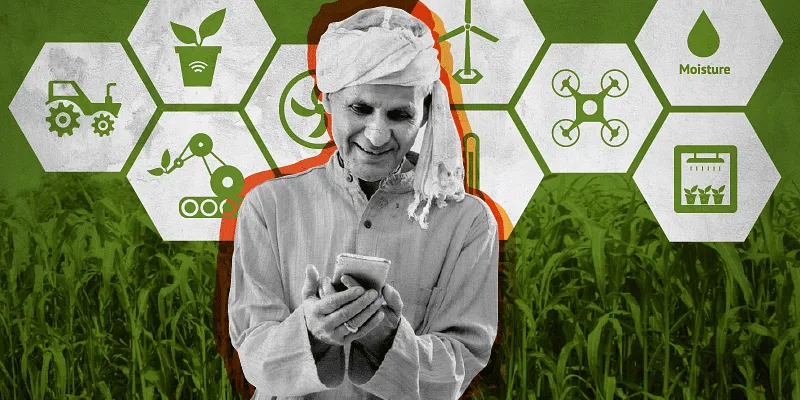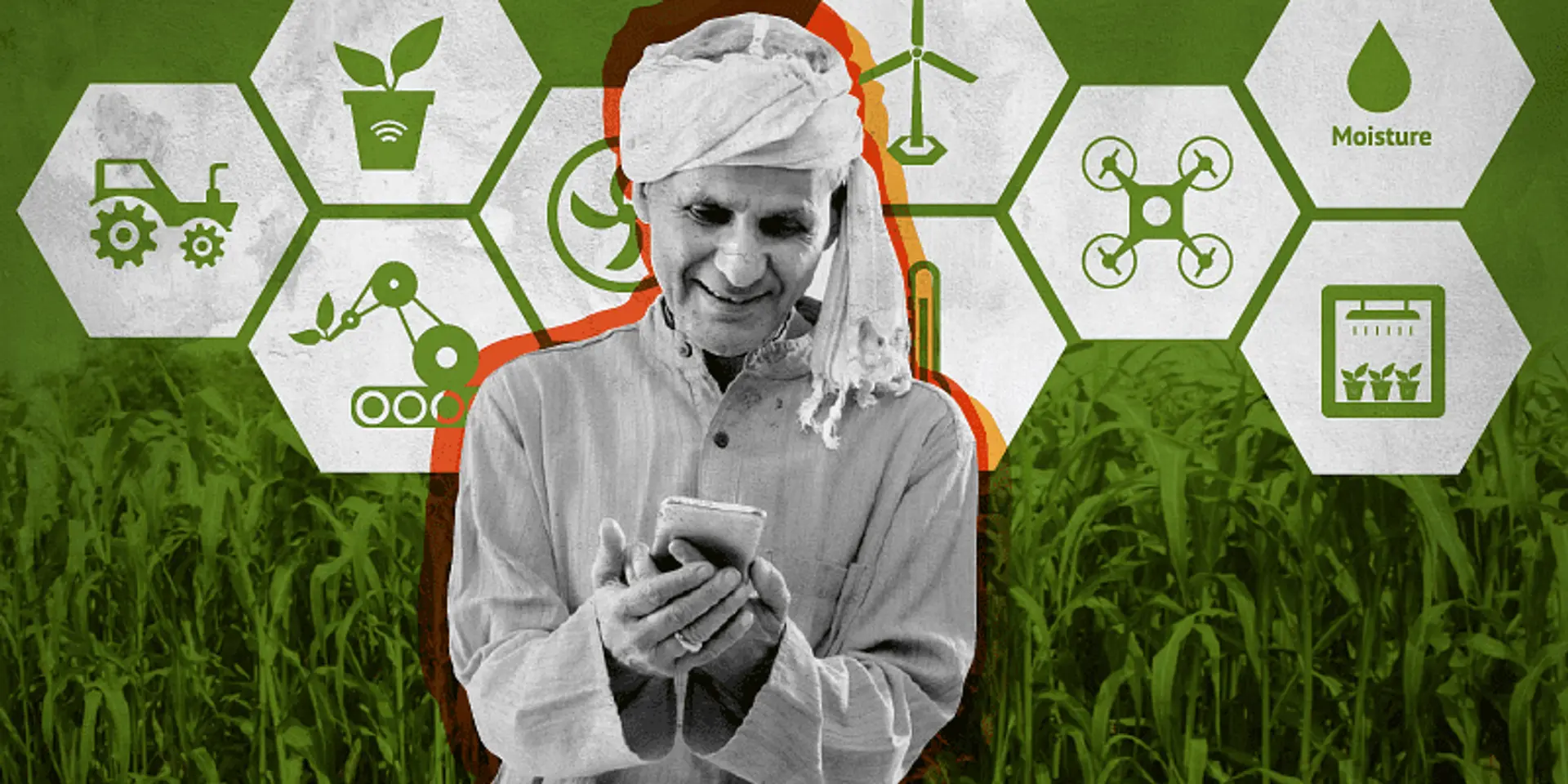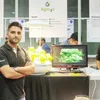This MeitY-backed deeptech startup uses IoT sensors to monitor farms and improve crops
Delhi-based deeptech startup AIGROEDGE has built a proprietary IoT sensor that monitors agricultural lands in real-time and improves crop visibility for farmers.
Serial entrepreneur and innovator Mayank Rajput has dabbled in sensory systems, electronics, and material design for almost seven years.
This is the electronics engineer's second entrepreneurship stint after StretchSkin Technologies, which he founded in 2018. The Singapore-based startup builds stretchable and wearable sensory systems for physical rehab, gaming, and training.
One of his colleagues was Abhai Tiwari, a Machine Learning engineer, who was also involved in water harvesting projects in India.
"Abhai belonged to a farming family and visited many agricultural lands to discover that infrastructure was low, and the farmer’s yield was quite poor. Affordability and accessibility were major problems,” Mayank tells YourStory.

AIGROEDGE Co-founders Mayank Rajput, Abhai Tiwari, and Akshay Taneja
Mayank and Abhai “validated the problem statement” for about six months before incorporating Aigro Labs LLP in mid-2019. Its mission was to enable farming in tech-controlled environments so that crop yields and farmer profits could be maximised.
The two also roped in IIT Roorkee graduate Akshay Taneja as the third co-founder, who had experience in electronics design automation (EDA). Soon, the co-founders realised that it was tough to get business in the LLP (limited liability partnership) model.
So, they renamed Aigro Labs LLP to Technologies, and was incubated by -backed Electropreneur Park in December 2019. Delhi-based EP has incubated 33 startups across six cohorts to date.
AIGROEDGE is a deeptech startup that enables precision farming through smart IoT sensory systems, data analytics, and Artificial Intelligence (AI). “Our vision is to create easily accessible and affordable smart agritech solutions for specialised agriculture," the co-founders say.
The startup joined EP’s one-and-a-half-year incubation programme, shortly before the coronavirus outbreak, and has largely remained unscathed from the lockdown.
What AIGROEDGE solves with IoT
AIGROEDGE has built a proprietary intelligent farming kit, which includes an Internet of Things (IoT) based sensory device known as ‘KRAASHAK’ and a SaaS-based analytics platform called AgriVitals.
“Just like humans, even plants have vitals. To grow a plant effectively, you have to regulate the agri vitals properly,” explains Mayank.
The Delhi-based startup measures soil parameters (temperature, moisture, conductivity, pH level, moisture absorbance rate); environmental parameters (temperature, humidity, atmospheric pressure, light intensity, CO2 level, and weather data from external stations); and geographic parameters in real-time by deploying multiple sensor nodes across agricultural fields.
Typically, one acre of land requires five sensors to capture adequate data.

KRAASHAK 1.0 is the proprietary IoT sensor built by AIGROEDGE
The high-precision sensors conduct quality assessments, detect diseases in plants, predict ambient conditions — sunlight, humidity, moisture, and pH and CO2 levels, etc. — that affect plant growth, and also offer personalised recommendations to farmers based on specific agricultural practices like horticulture, vertical farming, greenhouse farming, and organic farming.
KRAASHAK also uses advanced computer vision techniques and proprietary deep learning algorithms to predict farm yield, determine nitrogen content in the soil, offer better crop visibility, and eventually, improve profit margins for farmers.
Mayank says,
“The devices are mapped to the local server, and the data is sent there. The server can retain the data for some time, and then transfers it to the cloud-based AgriVital platform, which then provides predictive analytics for specific plant and crop models. Farmers can get all the analytics, insights, and personalised recommendations in layman’s language on a mobile app."
Further, AIGROEDGE’s custom sensing solution can quickly adapt to varied farming needs, thus enabling speed-to-market, which is critical in season-specific agricultural projects.

Business model and market opportunity
AIGROEDGE operates on a B2B model; its customers include farms and agritech firms, genetic and plant breeding companies, and government and farm finance providers. They are charged a one-time fee on the KRAASHAK device, and a recurring SaaS fee for AgriVitals.
Agritech companies can integrate AIGROEDGE’s API into their platforms to enhance their existing services. NBFCs and banks, on the other hand, can maintain farmers’ credit history and monitor his farm situation through their data.
The startup looks to sell 10,000 KRAASHAK devices, and deploy its sensors across 500 acres of agricultural land by June 2021.

One acre of land requires five sensors to capture adequate data
“We’re also talking to a few clients in Germany and other parts of Europe to license our sensing technology and sell the IoT devices as a white-label solution,” Mayank reveals.
The seven-member AIGROEDGE has already roped in clients, including organic and vertical farms, and farmers involved in specialised agriculture. It is projecting an ARR of Rs 2 crore. “People are short on money this year because of COVID-19, but we are expecting a 20 percent customer retention,” says the co-founder.
Its competitors include , , , and others, in a precision agriculture market, which is estimated to reach $11.3 billion by 2024, according to IMARC Group. “Agriculture is being recognised as an emerging sector. If you do not regulate effectively, your crops will not grow properly," Mayank says.
Funding and ecosystem support
Electropreneur Park provides the startup mentorship from hardware entrepreneurs, industry connect, and design support from Cadence, NXP semiconductor, ST Microelectronics, etc. along with funding assistance from the government.
“EP has also committed us Rs 7 lakh as a part of a CSR fund,” Mayank states.
AIGROEDGE is also supported by Software Technology Parks of India (STPI), which promotes and boosts software exports from India, and the India Electronics and Semiconductor Association (IESA).
It has even been recognised by DIPP (renamed to DPIIT) and the Startup India mission of the Government of India. In May, AIGROEDGE joined MANAGE, a programme run by the National Institute of Agricultural Extension Management in Hyderabad.
The startup is also a part of RAFTAAR, an agri-business incubator under the Rashtriya Krishi Vikas Yojana (RKVY) scheme managed by the Ministry of Agriculture and Farmers’ Welfare. RAFTAAR funds early-stage startups operating at the intersection of technology, science, and agriculture.

Mayank shares, “There are strategic mentors who guide us on ways to model and market products for agriculture. We also get to talk to research scientists and agri trade experts. RAFTAAR grants can go up to Rs 25 lakh.”
AIGROEDGE was also recognised as one of the top 20 global innovators at the World Bank’s 2020 Innovation Challenge for Agriculture and Food Security Risk Financing.
The startup claims that it is now being courted by several VCs from Southeast Asia and the US, and is looking to raise a Pre-Series A round of $2 million to $2.5 million over three to six months.
“But we will bootstrap our venture until we start making significant revenues,” says Mayank. The co-founder himself has invested about Rs 20 lakh in the company so far.
At a time when VCs are withdrawing term sheets owing to current market uncertainties, it could be a wise move for a startup to generate cash flows before raising capital.
Edited by Saheli Sen Gupta





1564671114666.png?fm=png&auto=format&h=100&w=100&crop=entropy&fit=crop)

